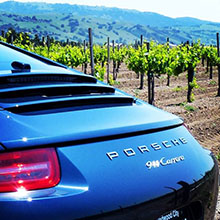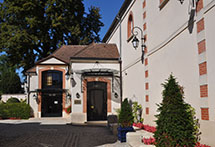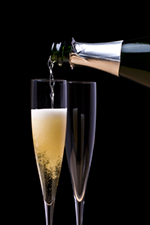|
| |
| Recent Labels |
| |
| Non-Vintage |
| |
| Nicholas Francois Billecart |
|
|
|
|
| |
| |
| |
Billecart-Salmon Le Clos Saint Hilaire 1998 Brut Blanc de Noirs Champagne |
Billecart-Salmon Le Clos Saint Hilaire 1998 is one of Billecart-Salmon's prestige cuvee champagnes. It is one of those difficult to find blanc de noirs style champagnes. Billecart-Salmon Le Clos Saint Hilaire 1998 is not available in all markets. Order on-line or ask your local wine store to place an order.
| Billecart-Salmon Le Clos Saint Hilaire 1998 |
| Characteristics |
|
|
|
|
| Category: |
Blanc de Noirs |
Prestige Cuvée: |
Yes |
|
| |
| Ratings (on a scale of 100) |
|
|
|
|
| Fine Wine 411 |
na |
na |
|
Retail Price |
| Wine Enthusiast |
na |
na |
|
(750 ml bottle) $400 |
| Wine Spectator |
na |
na |
|
|
|
|
|
|
|
|
Tasting Notes
Appearance: na
Aroma/bouquet: na
Palate: na
Additional comments: Champagne 411 has not reviewed this blanc de noirs champagne.
When to drink: na
| Le Clos Saint Hilaire 1998 Details
Label: Billecart-Salmon Le Clos Saint Hilaire 1998 Champagne
House/Winery: Billecart-Salmon
Wine Category: Sparkling Wine
Region & Country: Champagne, France
Type (Style): Vintage, Blanc de Noirs
Sweetness Level: Brut
Dosage: 0 grams per liter
Prestige cuvée: Yes
Vineyards: 100% Premier Cru
Grapes:100% Pinot Noir
Alcohol: na
Go to Champagne Details for a description of the above types, characteristics, and grapes. |
Billecart-Salmon Le Clos Saint Hilaire 1998
Production
Billecart-Salmon uses the méthode champenoise for their champagne production. Le Clos Saint Hilaire 1998 is composed of 100% Pinot Noir grapes harvested from a small Billecart-Salmon vineyard at the family estate in Mareuil-sur-Ay (a highly rated premier cru village). The wine is vinified in oak with zero dosage.
Billecart Salmon uses a technique called double debourbage. Solids in fresh juice settle to clarify the juice, then a second 'cold' settling occurs at about 40 degrees Fahrenheit for at least 48 hours. This process ensures the purest of juice will be used for fermentation. The fermentation process typically takes place over 3 to 4 weeks at a temperature not to exceed approximately 57 degrees Fahrenheit (typical fermentation at most houses is 1 week at about 68 degrees Fahrenheit). |




